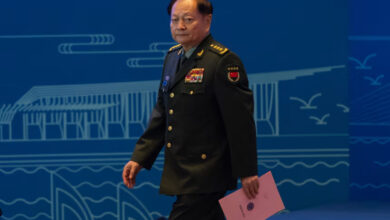With elections approaching, NGOs say they are experiencing the same harassment and pressure that they did under former President Hosni Mubarak. While the exact legal measures being taken against them remain unclear, NGO workers say they are facing a campaign to tarnish their image among the general public.
The Egyptian cabinet announced last month that a Justice Ministry report had identified about 30 NGOs that have been illegally receiving foreign funding and are not registered with the Ministry of Social Solidarity, which oversees such organizations. Minister of Justice Mohamed Abdel Aziz al-Guindi said earlier that these organizations currently face charges of treason for conspiring against the country by sending sensitive information to foreign parties.
Among the 30 NGOs waiting to be summoned for interrogation are many that plan to take part in monitoring the upcoming parliamentary and presidential elections. The Supreme Council of the Armed Forces (SCAF) recently rejected monitoring of the elections by international bodies, but the High Electoral Committee announced on Monday that local groups would be granted “monitor” status during the vote, which is set to begin on 28 November.
According to reports in Egyptian newspapers, one NGO allegedly received LE181 million in one month, a sum which put the organization’s spending over its operating budget.
Two months ago, the Central Bank of Egypt (CBE) ordered banks to provide the Ministry of Social Solidarity with information about transactions involving charities and civil society organizations.
“This is a blatant attempt to restrict human rights organizations that played a role in exposing the authorities’ violations,” said Hossam Bahgat, director of Egyptian Initiative for Personal Rights (EIPR).
Bahgat accused the government and the SCAF of leading a “vilification campaign” against civil society in an attempt to weaken its critics.
A number of human rights groups, including EIPR, and the informal activist group No Military Trials for Civilians are leading a campaign against the use of military tribunals for civilian trials. Since the SCAF came to power in February, about 12,000 civilians have been sentenced to prison by military courts, according to the military council.
In the wake of pressure from the campaign, the military court cancelled the sentences of a number of protesters.
Similarly, lawyers from advocacy groups have represented victims of torture and physical abuse by the military.
“Back in the days of Mubarak, the government used to purposely crackdown on NGOs, especially before elections, to hinder monitoring. The SCAF is doing the same now,” said Mona Ezzat, a member of the New Woman Foundation, an Egyptian women’s rights group. Ezzat does not know if her organization is under investigation.
The ministry has not disclosed the names of NGOs under investigation or the details of their illegal activities, which, according to activists, prove the allegations are part of a smear campaign against civil society, rather than a legitimate criminal investigation.
Mahmoud Rady, a lawyer with the United Group, which provides legal assistance to NGOs, told Al-Masry Al-Youm that until now, no official investigation has been launched against any NGO.
“The ambiguity of the investigation process results in inaccurate, leaked media reports that portray all civil society organizations as corrupt,” said Ezzat.
Bahgat believes it is important to demystify the specter of foreign funding. “Foreign funding is not a crime. The government is the biggest recipient of foreign funding, and it is done according to bilateral agreements with other countries,” said Bahgat. He noted that Egypt is the second largest recipient of US aid after Israel.
Law 84/2002 requires NGOs to get approval from the Ministry of Social Solidarity before they can receive foreign funds. The ministry has the authority to block funding for several reasons, including if it judges that the purpose of the funding falls outside the organization’s stated mandate. Employees of the organizations face imprisonment and a fine if convicted.
In order to escape the restrictive provisions of the law, many organizations register as nonprofit companies and law firms.
“Foreign funding is not prohibited for the state and its institutions or for the official state councils on human rights, women, or children,” said a statement signed by 36 rights groups following the government’s accusations two months ago.
“Nor is foreign funding a sensitive issue for thousands of development associations and charitable groups that receive foreign grants, as the activities of these groups and institutions are not based on a critical evaluation of the performance of the state and its institutions in the sphere of human rights,” the statement said.
However, as Bahgat pointed out, most of the grants that come from or through the government are allocated to philanthropic projects, rather than advocacy activities that might be of concern to government officials.
“The government deals with advocacy groups as enemies rather than partners. That’s why the government doesn’t provide funding for such organizations,” said Bahgat.
Advocacy groups have been especially active in providing legal assistance for people who can’t afford lawyers’ fees.
“In Egypt, the poor are deprived of their right to litigation,” said Adel Ramadan, a human rights lawyer.
“Advocacy organizations use the money from foreign grants to provide free legal assistance for people. I can’t ask a victim of a human rights violation to pay money.”
Bahgat added that the money is also used to pay for research expenses that document violations of human rights, awareness campaigns that are the main tool in exposing abuses to the public, and monitoring to reveal election irregularities.
According to a report released by the US-based democracy advocacy NGO called The Project on Middle East Democracy, US$65 million has been earmarked from the 2012 US federal budget to support democratic development in Egypt. In the meantime, the US Department of State's financing for Egypt remained constant at US$1.3 billion.
The Egyptian government also receives foreign aid from Canada, Europe and the Arab Gulf States.
If NGOs are forced by the government to give up their sources of foreign funding, it could spell the end of Egypt’s civil society, says Bahgat, who bemoans that domestic funding sources for civil society are few.
“The Mubarak government didn’t allow civil society to cultivate local sources of funding. It even scared away potential donors through its allegations against NGOs,” said Bahgat.
While a potential alternative source of funding could be local businessmen, they may be motivated by pursuing their own political agendas through NGOs, says Rady, the lawyer who assists civil society organizations. They might, for example, use NGOs at the grassroots level as a channel to reach their constituencies in parliamentary elections.
Rady added that businessmen mostly donate to charity and not to development or human rights groups.
Bahgat, meanwhile, stressed that “resources must not dictate NGOs’ agendas.”
Civil society organizations must maintain their independence and credibility by setting their priorities based on their assessment of human rights needs and not donors’ agendas,” said Bahgat.




